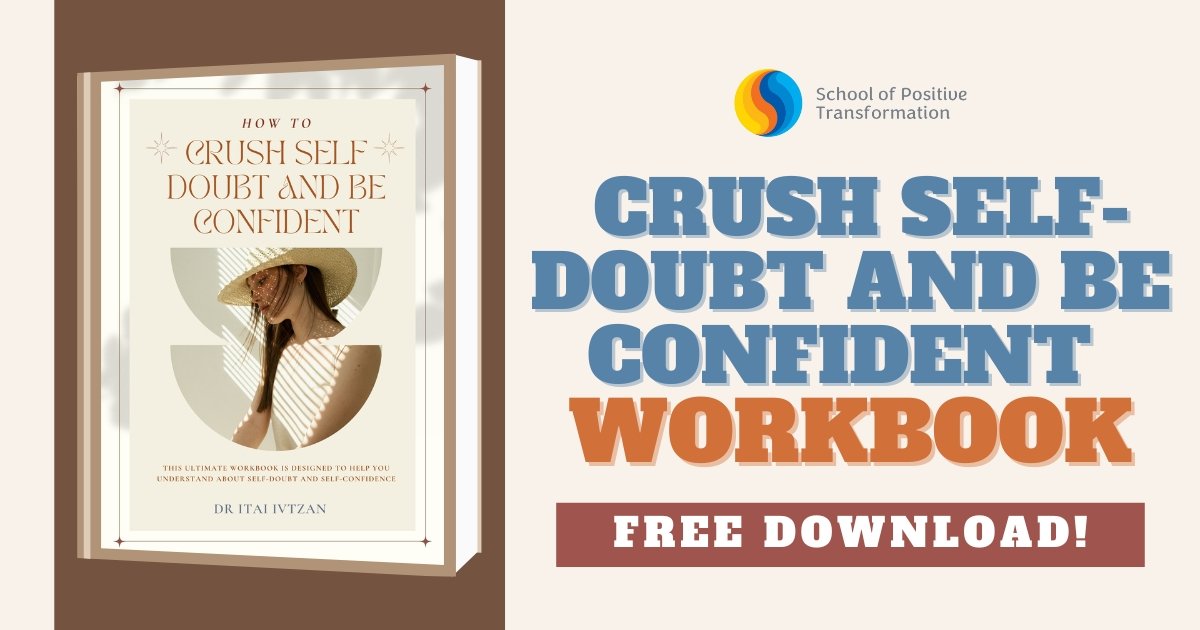Masters in Applied Positive Psychology— An Experiment To Explain How I Moved On From Being Ghosted
 The masters in applied positive psychology provides educational and training options for students interested in grouping themselves academically and practically in a positive psychology-based orientation to helping others.
The masters in applied positive psychology provides educational and training options for students interested in grouping themselves academically and practically in a positive psychology-based orientation to helping others.
Enrolling in a positive psychology program has taught me about how altruism and honesty (as one of the character strengths) played vital roles as I healed from being ghosted.
But before you continue you might like to consider our free worksheet on exploring “Crush Self-Doubt and Be Confident”. Please download this worksheet here.
If you’ve been dating this past decade, ghosting is a term that you might have already heard and have most likely experienced. I’m quite sure it will only be a few of you but, for those who have no idea what ghosting is, well here it is: Ghosting means suddenly discontinuing all contact with another person to end a relationship, or simply what it was used to be called: the slow fade.
A breakup that came out of nowhere is what comprises a typical ghosting story! I was fortunate to be enrolled before in a positive psychology program about coaching as I was moving on from one.
The course was not only a good distraction but it also taught me things that wouldn’t have realized on my own. There was this one social experiment that was assigned for reading that I believe helped me understand that I should remember that the act of ghosting says more about the other person than it is about me.
And two things played a major role here— altruism and honesty.
What is Altruism?
Honesty is one of the Psychological Strengths
The Experiment About Altruism And Honesty: “Is Altruism Making People Dishonest?”
How Ghosting is Related to Altruism and Honesty and What To Do
Gizem Saka, a contemporary artist, and an economist made an experiment using an altered version of the “dictator game” and related how altruism surprisingly resulted in lower levels of honesty!
In applied positive psychology, behavioral economics, and social psychology, the dictator game is just one of the methods used in experimentation. Briefly discussed below is the ultimatum game and its alternative version the dictator game.
The ultimatum game (Guth et al., 1982) is described by Houser as “a simple, take-it-or-leave-it bargaining environment.” Here, two parties work together anonymously and only once (to prevent a sense of reciprocation). The first person suggests how to divide a sum of money with the second person. If the second person rejects this proposal, both of them don’t get anything. If the second accepts, the first gets her part and the second gets the rest.
The dictator game, by Kahneman (1986), on the other hand also involves two parties, a giver and a receiver. But in this game, the second person acts passively and cannot reject or have any influence on the decision of the first person. Therefore, if the first person decides that they do not want to give anything to the second person, then the second person receives nothing.
But just before we look more into the social experiment by Saka and talk about how it relates to ghosting, let us first learn the basics of altruism and honesty.
What is Altruism?
The American Psychological Association defines altruism as: “Altruism refers to behavior that benefits another individual at a cost to oneself. For example, giving your lunch away is altruistic because it helps someone hungry, but at a cost of being hungry yourself.”
By far, this definition by Thomas Nagel provides the best idea:
“By altruism, I mean not abject self-sacrifice, but merely a willingness to act in the consideration of the interests of other persons, without the need of ulterior motives (1970, p. 79).”
This explanation provides two parts:
- Altruism is done in consideration of others (self-sacrifice is not a prerequisite)
- The behavior does not have any hidden motive for self-gain or selfishness.
Bernd Heinrich related an example of altruism (in animals) when he chanced upon a dead moose flocked by ravens. He observed that the ravens were keen on sharing the feast with other ravens (and thus calling them through distinct calls and by going back to their nests to bring the others) instead of just having it for themselves.
This phenomenon that he observed may be a selfless act for the ravens but it still has a selfish gain, which is known as ‘kin selection’. According to Heinrich, “It’s part of our social nature to help those that we are associated with”. An article by Dingfelder entitled “Altruism: an accident of nature?” discussed how altruism may have been an evolutionary adaptation formed unintentionally because pure altruism is a form of “primitive insurance policies” brought about by kin selection. This study is just one of the many pieces of research that stand by the claim that altruism is innate.
Our positive psychology program, looked into a study by Barragan and Dweck which on the other hand showed that altruism may not entirely be innate— that although it may have been a beneficial evolutionary adaptation, there are still other factors that then formed this sense of selflessness.
Their study involved children who engaged in reciprocal play (where an experimenter plays the same ball with a child while talking to them) and parallel play (the child and experimenter play a different ball, on their own, while talking to each other). The experimenter on both setups will then knock over a glass of water. Children who were playing reciprocally were found to more likely help the experimenter, and thus showed how a sense of social trust initially founded was crucial to developing altruistic behavior.
There are lots of other studies about altruism that not only tackle its roots but also its affect on different behaviors—one of which is honesty.
Honesty is one of the Psychological Strengths
Honesty is one of the 24 Character Strengths that falls under the virtue category of Courage. Under the virtue of courage are the other psychological strengths: bravery, perseverance, and zest.
Courage describes strengths that deal with overcoming fear. These strengths can manifest themselves inwardly or outwardly as they are composed of cognitions, emotions, motivations, and decisions.
The VIA Character Strengths can be found briefly discussed on viacharacter.org, and they define honesty as:
“This strength involves accurately representing your internal states, intentions, and commitments, both publicly and privately. The strength of honesty is often linked to self-concordance – the extent to which your goals accurately represent your implicit interests and values. Honesty allows people to take responsibility for their feelings and behaviors, owning them, and reaping benefits by doing so.”
You can take up a VIA character strengths survey and at the viacharacter.org website to discover your strengths!
 The Experiment About Altruism And Honesty: “Is Altruism Making People Dishonest?”
The Experiment About Altruism And Honesty: “Is Altruism Making People Dishonest?”
This article by Gizem Saka, “Is altruism making people dishonest” discussed her social experiment about cheating and she found that people cheat when they treat others “too fairly”.
Saka works in academe where students are not monitored during exams, which assumes that the certain no-punishment-no-monitoring scheme will make students be more responsible and bear mutual respect for the system. In her experiment, she wanted to bring attention not to the big feats of cheating but rather to the small, and seemingly “harmless” acts.
The experiment was divided into two parts. The first part of the experiment focused on altruism and goes like this:
- Participants (kept anonymous but designated with numbers) were divided into two groups a Sender and a Receiver.
- Every Sender was given $10, which then they are asked to share with a random Receiver. The Sender can choose not to give any to the Receiver if they want to have the $10 for themselves.
This game somehow measures the “altruistic” or fairness consideration of the Sender. Participants were then surveyed on how much a “fair allocation” is, most claim that 50-50 is the fairest distribution. But only one-fifth of the participants abided by this.
The second part focused on honesty:
- She gave participant 20 multiple choice questions that are to be solved in 5 minutes
- She collected the answers then gave them an answer key and instructed the participants to count their correct answers themselves, as correct answers will be given due incentives.
- All participants are completely anonymous, so, therefore, they can claim that they have answered more correct questions than they did.
Results were as expected, more than 50% of the 170 people claimed more correct answers than they did, only 2 claimed that they solved all questions. This shows that even in the blanket of anonymity and or getting caught, people did not cheat all the way.
Saka wanted to see if dishonesty is triggered by previous events. The following are the results that she got:
- Receiver behavior was as expected. Receivers who were given less than $5 cheated more on the second part.
But this is no longer surprising as people who cheat will usually rationalize their act of dishonesty to previous unfair treatments to justify their claim that through cheating, they now will get what they “deserved” in the first place.
What surprised Saka were the Senders‘ behavior who exhibited high levels of altruism in the first part (those who sent $4-$5). After giving a survey about fair allocation amounts, Senders were told that the average amount sent in these games was typical $2. The Senders who sent $4-$5 in the first part seemingly wanted to get even and therefore cheated deliberately on the second part!
Saka said, “It seems like Senders accumulated ‘moral currency’ by being altruistic, which they later ‘spent’ on a little cheating… it was interesting to see how quickly people were willing to use up the moral points they have gained.”
We go back to the question of this article. Is then altruism making people dishonest? The answer lies in the concept of perceived fairness.
When people perceive that they have been taken advantage of before, they are more likely to be dishonest to achieve a sense of getting even.
How Ghosting is Related to Altruism and Honesty and What to Do
As an applied positive psychology practitioner, we can use this experiment by Saka in understanding the concept of ghosting. I’ve mentioned earlier in this article that the act of ghosting says more about the other person than it is about us.
Well as Saka’s experiment has concluded, people who have experienced being taken advantage of before are more likely to use acts of dishonesty to justify and have a sense of getting even.
This made me realize that when people “ghost”, it is their act of being dishonest because maybe:
- They are not on the same level of relationship that you want to happen to the two of you
- They’ve also been ghosted before and want to feel like they can get even
- The act of avoidance shows a lack of courage on their end because they cannot be honest with their feelings and thoughts, they become submissive to differences and cannot really work it out with you
- They have not resolved the emotional burdens from their past relationship
- They are in complicated and stressful circumstances
Just like Saka’s experiment, altruistic people (they may be caring and do selfless acts) may still have tendencies to be dishonest (or ghost) if they have to satiate a sense of fairness or a means of grabbing a privilege that they have not had before.
When people ghost, remember that it is not about you, it was them questioning their worth and also wants you to feel that way. It is their act of self-preservation and do you know the best things to do after being ghosted?
- YOU WALK AWAY. You don’t nag them by asking why because the more that you give them the attention, the more it is that they get the privilege of hurting you.
- Heal away from them. Most wounds won’t heal if you keep picking the scabs.
- Remember that you are hurting, because they were hurt first. Sometimes people get into dating without healing first or having any closure from their pasts. They are a walking hurricane that you can’t tame because the healing that they need should come from themselves alone.
- Forgive. Remember that forgiving does not always mean that you have to inform them. Although the previous could make you feel lighter, sometimes it takes a long time to finally bestow true absolution to others.
- Continuously develop bravery
. How? Face those feelings as they come, be not like those who fear honesty.
Slow down. Truly enjoy moments even the pains of growth and development. Try mindfulness practices to further strengthen the act of savoring.

Remember to develop your honesty because it is one of the character strengths that can help you find the person that’s right for you. Learning about this experiment on my positive psychology program, not only gave me the confidence that there was nothing wrong with me, but it also made me resilient in circumstances that make me feel inadequate.
The most important lesson from masters in applied positive psychology you should believe that you can always grow from a setback like that. Even tree stumps find ways to sprout again.
If you’re ready to build resilience, trust your own worth, and grow from setbacks, download our free ‘Crush Self-Doubt and Be Confident Workbook’ and take the first step toward healing and personal empowerment today.





